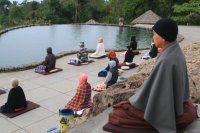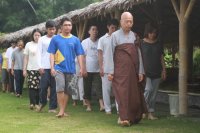Why We Practice Meditation
There are many reasons that make people learn about Chan meditation. In the beginning we don’t really know what Chan meditation is. Then we engage in the practice.

After attending a 9-day Huatuo Retreat led by Guo Yuan Fashi, we were asked to share our experience. Some of us write our sharing in Facebook group that was specially created for this purpose. Chang Hu Fashi asked some of us to write in English.
I read all sharing uploaded in the group and many comments that came up after sharing. Their sharing motivated me to write this sharing.
Why we practice meditation.
There are many reasons that make people learn about Chan meditation. In the beginning we don’t really know what Chan meditation is. Then we engage in the practice. A lot of my friends have attended a number of meditation retreats for many times. For me, this is my sixth Chan retreat and my eleventh meditation retreat.
Many of us have achieved some good experiences in meditation. These triggered us to keep coming to the retreats. In our sharing, we tend to write many good things that happened in the retreat. It creates some “wow” effect. It also gives a sense of successful achievement in the retreat. It is a good thing indeed. But is this the purpose of Chan teaching?
In the last retreat, we learned about huatuo method. In the DVD, shigong Sheng Yen gave a brilliant explanation about huatuo. Shigong also said about straight forward mind (一直心)or one conduct samadhi / single application samadhi (一行三昧). It is the practice to keep our mind at peace, focused, having no emotional distraction.
Many of the retreat participants really appreciate the huatuo method. But how we understand this method? There are some participants that use huatuo as a powerful sword that can destroy all vexations that pop up in our mind. So when we are angry, we remember our huatuo, “Who is someone that is getting angry?” “Who is someone that is getting disappointed?” “There is no I, then it’s not logical to get angry. No one is angry.”
Then our vexations decrease or disappear. And we are happy. Our mind comes back to the condition that is like what is described in the “Straight Forward Mind”. Then we say that huatuo method is very powerful. It can be used to encounter bad mood.
Although all of the above is not a bad thing, Chan practice is not just for achieving happy, peaceful state of mind. That experience just comes and goes.
This good thing can not last forever. The purpose of Chan practice is something higher than that. I remember the story of Master Huineng. Trying to keep our mind in good, peaceful state is like what Master Shen Hsiu wrote in his stanza. We just try to keep the mirror clean, no dust. Although it can make the practitioner born in heaven, it is not the purpose of Chan practice.

In my opinion, huatuo is not for this purpose.
I think, whatever the method in use, a practitioner must jump and get out from this “sense of I” and see what this “sense of I” is. This “Sense of I” always makes us think about good and bad, about You and I. It makes us try to reach something for our self. It makes us see everything from the viewpoint of “what is in it for me”. This is the nature of I. Therefore, the “Sense of I” creates a lot of tension, suffering in our lives.
But, it really needs a “great miracle” to make someone put down everything; to let go and surrender his/herself; to see this heavy burden of the “sense of I”.
It is more difficult to see that this “sense of I” is just a “view” in our mind. It is an illusion. Like what Master Huineng said that “the mirror has no stand”.
Once we see this heavy burden of “sense of I”, then suddenly we change our direction of practice. We are no longer pursuing happy state of mind or achieve good experience in meditation. But, we learn to let go and put down this heavy load of “I”.
Unfortunately, this cannot be achieved when “I want to achieve” this. So I just pray to all Buddhas and Bodhisattva for this. Try not to think about enlightenment or to remove any vexations. Just use the method.
Deep Bow
(Shared by Robby)